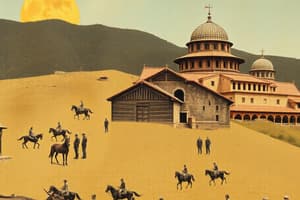Podcast
Questions and Answers
Selçuklu İmparatorluğu hangi Türk boylarının istilasıyla kurulmuştur?
Selçuklu İmparatorluğu hangi Türk boylarının istilasıyla kurulmuştur?
- Peçenek Türkleri
- Kıpçak Türkleri
- Oğuz Türkleri (correct)
- Uygur Türkleri
Hangi Selçuklu lideri, Buyidlerin üzerine başarılı bir sefer düzenleyerek batı İran ve Mezopotamya'yı ele geçirmiştir?
Hangi Selçuklu lideri, Buyidlerin üzerine başarılı bir sefer düzenleyerek batı İran ve Mezopotamya'yı ele geçirmiştir?
- Malik-Shah
- Toghrïl Beg (correct)
- Alp Arslan
- Manzikert
Hangi zafer, Anadolu'ya yerleşmelerine izin vererek tarihte bir dönüm noktası olmuştur?
Hangi zafer, Anadolu'ya yerleşmelerine izin vererek tarihte bir dönüm noktası olmuştur?
- Manzikert'teki zafer (correct)
- Toghrïl Beg'in zaferi
- Malik-Shah'ın zaferi
- Alp Arslan'ın zaferi
"Sultanate of Rum" olarak da bilinen hangi imparatorluk, etnik açıdan çeşitli Hristiyanlar, Ermeniler, Yunanlılar ve İran Müslümanlarını içinde barındırmaktaydı?
"Sultanate of Rum" olarak da bilinen hangi imparatorluk, etnik açıdan çeşitli Hristiyanlar, Ermeniler, Yunanlılar ve İran Müslümanlarını içinde barındırmaktaydı?
Hangi Selçuklu liderleri, imparatorluğu tüm İran ve Mezopotamya'yı kapsayacak şekilde genişletmiştir?
Hangi Selçuklu liderleri, imparatorluğu tüm İran ve Mezopotamya'yı kapsayacak şekilde genişletmiştir?
Selçuklu İmparatorluğu hangi kültürlerden ve dinden etkilenerek bölgede benzersiz bir siyasi ve dini etki yaratmıştır?
Selçuklu İmparatorluğu hangi kültürlerden ve dinden etkilenerek bölgede benzersiz bir siyasi ve dini etki yaratmıştır?
Selçuklu İmparatorluğu döneminde, aşağıdakilerden hangisi Farsça kültürün yayılmasına katkıda bulundu?
Selçuklu İmparatorluğu döneminde, aşağıdakilerden hangisi Farsça kültürün yayılmasına katkıda bulundu?
Aşağıdakilerden hangisi Selçuklu İmparatorluğu'nun idari yapılanmasına dair doğru bir ifadedir?
Aşağıdakilerden hangisi Selçuklu İmparatorluğu'nun idari yapılanmasına dair doğru bir ifadedir?
Selçuklu İmparatorluğu'nun çöküşüne yol açan temel neden aşağıdakilerden hangisidir?
Selçuklu İmparatorluğu'nun çöküşüne yol açan temel neden aşağıdakilerden hangisidir?
Selçuklu İmparatorluğu'nun İslam medeniyetine katkılarından biri değildir?
Selçuklu İmparatorluğu'nun İslam medeniyetine katkılarından biri değildir?
Selçuklu İmparatorluğu hangi bölgede kuruldu?
Selçuklu İmparatorluğu hangi bölgede kuruldu?
Aşağıdakilerden hangisi Selçuklu İmparatorluğu'nun miraslarından biri değildir?
Aşağıdakilerden hangisi Selçuklu İmparatorluğu'nun miraslarından biri değildir?
Study Notes
Political Developments in the Seljuk Empire: Turkey's History
Origins and Expansion
The Seljuq Empire, founded by Turkish nomads from Central Asia, began its journey around the 11th century when the tribe of Oghuz Turks invaded southwestern Asia. They encountered the Ghaznavids, another powerful empire that had established itself in eastern Iran and Afghanistan. After a successful campaign against the Buyids of Iraq, the Seljuqs under their leader Toghrïl Beg extended their rule over western Iran and Mesopotamia. During this period, the Seljuk Empire incorporated elements of both Persian culture and Sunni Islam, creating a unique blend of political and religious influences that would shape the region for centuries to come.
The Great Seljuk Empire and Its Impact
The Seljuq Empire reached its zenith during the reigns of Alp-Arslan and Malik-Shah, who expanded the empire to include all of Iran and Mesopotamia, Syria, including Palestine, and even parts of Egypt. Alp-Arslan's victory at Manzikert in 1071 marked a turning point in history as it opened the Byzantine frontier to Oğuz tribesmen, allowing them to settle in Asia Minor and eventually form the Anatolian Seljuk Empire, also known as the "Sultanate of Rum". This empire was ethnically diverse, with various minority groups such as Christians, Armenians, Greeks, Syrians, and Iranian Muslims coexisting within its borders.
Cultural Autonomy and Influences
Persian cultural autonomy flourished in the Seljuq empire, leading to the spread of literary Persian throughout Iran and the disappearance of Arabic except in works of religious scholarship. This period also saw the establishment of madrasas, Islamic colleges capable of giving uniform training to state administrators and religious scholars. These institutions played a crucial role in shaping the future of Islam and education in the region.
Political Organization and Structures
Under the sultans Alp-Arslan and Malik-Shah, the Seljuq empire was organized politically and religiously, leaving a strong legacy that influenced later Muslim dynasties. Niẓām al-Mulk, a vizier during this period, oversaw the empire's organization during both reigns, fostering a centralized administration that helped maintain stability. However, following the death of Malik-Shah, the Seljuq empire experienced internal struggles as provinces were divided among deceased rulers' sons, leading to numerous independent and unstable principalities.
Religious and Cultural Legacies
Despite these challenges, the Seljuq Empire left an indelible mark on Islamic civilization through its integration of different cultures and religions into its ruling structures. The empire introduced new architectural styles, fostered trade networks along the Silk Road, and contributed significantly to the formation of the Ottoman Empire, which later became modern Turkey.
In conclusion, the Seljuq Empire played a vital role in shaping the political landscape of Turkey and the Middle East, incorporating elements of diverse cultures and religions into its governance. Despite facing numerous challenges, the empire left behind a rich legacy that continues to influence the region today.
Studying That Suits You
Use AI to generate personalized quizzes and flashcards to suit your learning preferences.
Description
Explore the origins, expansion, cultural influences, political organization, and religious legacies of the Seljuk Empire, a key player in shaping the political landscape of Turkey and the Middle East. Learn about the impact of leaders like Alp-Arslan and Malik-Shah, the incorporation of Persian culture, and the empire's contributions to Islamic civilization.




